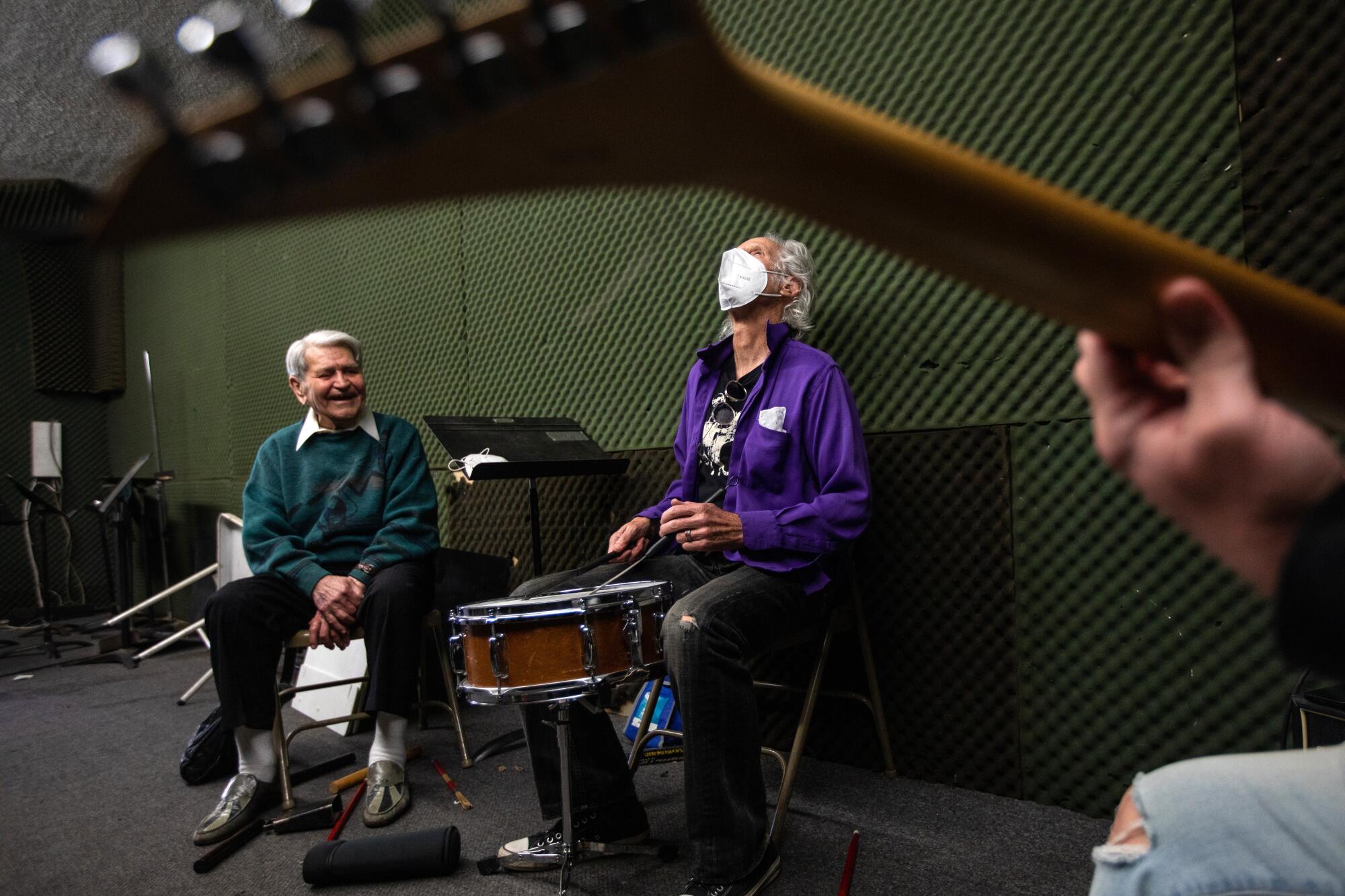
It was around midnight when Steve Hideg made a trip to his bathroom, got dizzy and took a fall.
“I hit my head over here,” Hideg told me, pointing to the edge of his bathroom sink. He lay on the floor next to the bathtub for about 20 minutes, hoping to regain his strength and get back on his feet.
Hideg, 91, is blind in one eye and deaf in one ear from injuries suffered when bombs rained on Budapest during World War II. In recent years he’s become shaky on his feet, and he’s taken several falls in his one-bedroom apartment in East Hollywood.
But the one last August was a bad one.
Photographer Francine Orr heard about it and alerted me. We’d collaborated on a story about Hideg in 2017, when we learned the jazz drummer and band leader’s rent was higher than his monthly income. At the time, he called his situation a “beautiful struggle.” He was broke but still doing the thing he loved, playing in small bands here and there.
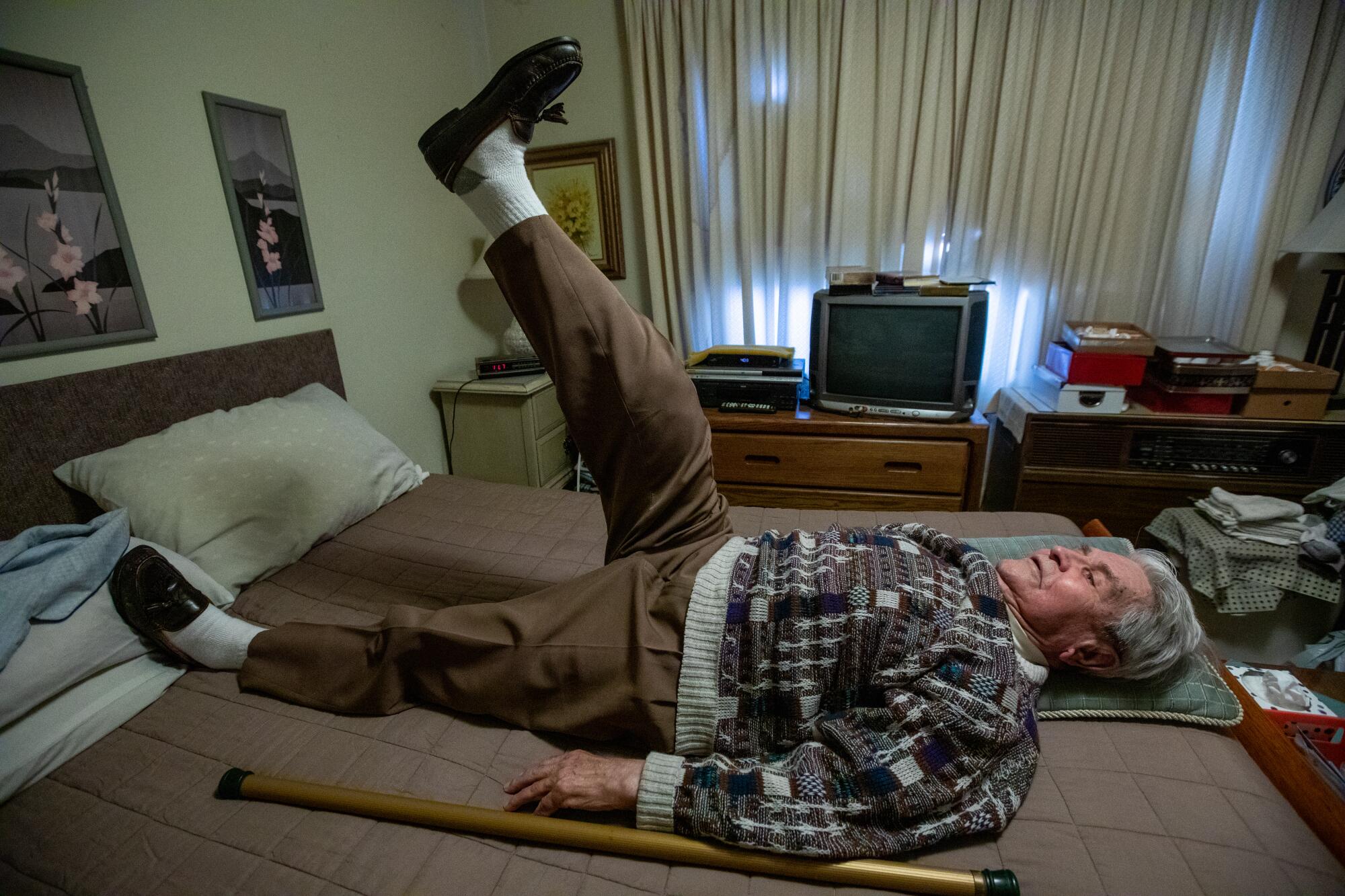
On my latest visit, Hideg reenacted his fall and retraced the path he had crawled — about 15 feet from the bathroom to the kitchen. He felt dehydrated and needed a drink. Near the kitchen, he managed to pull himself to his feet, only to fall again.
California is about to be hit by an aging population wave, and Steve Lopez is riding it. His column focuses on the blessings and burdens of advancing age — and how some folks are challenging the stigma associated with older adults.
Hideg ended up flat on his back on the kitchen floor in considerable pain. He reached for a nearby water jug, but he’d badly injured his right shoulder and was too weak to open it. He had stopped wearing a necklace medallion that can be used to call for help because it was overly sensitive and made frequent, unnecessary calls.
So he lay there on the floor, through the night, hoping he’d regain the strength to rise back up. He estimates he was there about 12 hours, until the phone rang from its perch on top of a stack of filing crates near the kitchen. Hideg’s cane was close enough for him to stretch out, grasp it, and use it to hook down the crate.
I’m a fighter. I am a guy who works with what I have,”
— Steve Hedig, 91-year-old jazz drummer
He answered the phone. It was someone from Meals On Wheels, asking why he hadn’t buzzed in the delivery person at the front gate. Hideg told the caller what happened, then called 911.
At the hospital, doctors found one possible explanation for Hideg’s dizziness, in addition to an irregular heartbeat. He had COVID-19. Hideg, who is diabetic and a survivor of bladder cancer, was hospitalized for several days. After his release, he visited an orthopedic specialist and got some devastating news.

His shoulder tendons were so severely torn, they couldn’t be repaired.
“I am a fighter,” said the man whose love of jazz began as a kid, when he worked at a movie theater in Hungary and caught glimpses of Louis Armstrong and Glenn Miller. Hideg reminded me that he had survived war, endured a daring escape from Europe in 1956 during the Hungarian Revolution, and arrived in the U.S., penniless, with his wife.
“I am a guy who works with what I have, and this doesn’t mean I’m going to give up” music, he said. “This is the reason I came to America.”

Steve Hideg came to the United States with nothing and still has nothing. Despite poverty and health problems, the 85-year-old drummer is happy to live out his American dream, his self-described wonderful struggle.
I shared this update recently with drummer John Densmore, who made a donation to Hideg in 2017 after reading that he was in danger of losing his apartment. By the way, Densmore’s wife, painter and photographer Ildiko von Somogyi, is the daughter of Hungarians who left the country about the same time as Hideg.
I told Densmore, who was inducted in the Rock and Roll Hall of Fame as a member of the Doors, that Hideg was back to teaching and hosting a weekly jam session at Stein on Vine, the Hollywood music shop frequented for decades by some of the biggest names in jazz. When Densmore heard that Hideg couldn’t move his right upper arm, but was drumming with a wrist motion, he wanted to see it for himself.
He recalled from the 2017 story that Hideg is an eternal optimist.
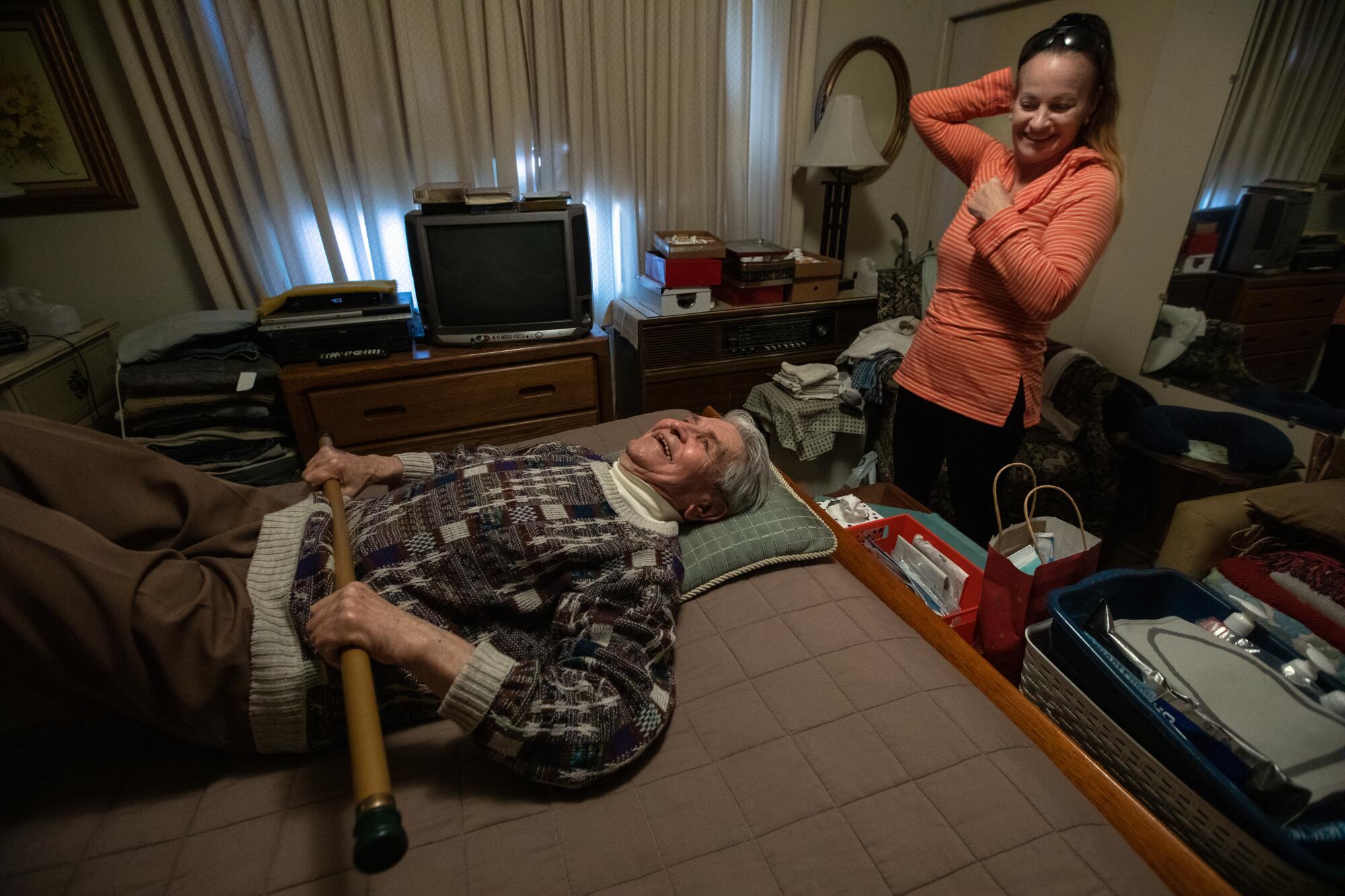
“He has this smile on his face, and somehow that got there because of music,” said Densmore, 78, whose love of music extends to jazz and classical (I wrote recently about his friendship with L.A. Phil conductor Gustavo Dudamel). In his book “The Seekers,” Densmore pays tribute to jazz drummer Elvin Jones. He says the way Jones and sax great John Coltrane meshed helped inspire his own work with Jim Morrison of the Doors.
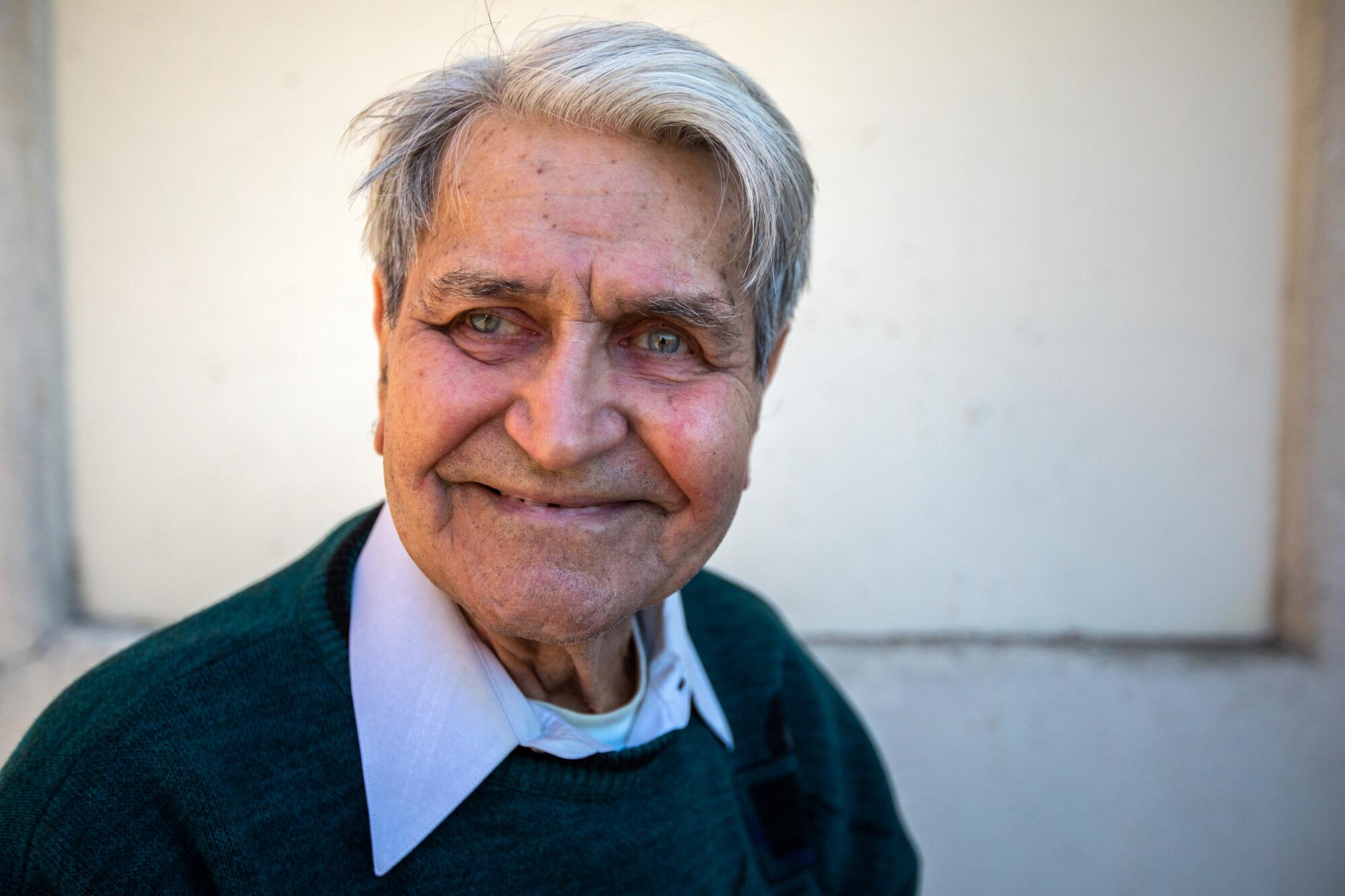
On a recent Saturday, Stein on Vine owner Gary Chen unlocked the back music studio where Stan Getz, Ray Brown and a host of all-stars once gathered. Hideg set up his snare drum in the company of pianist Cengiz Yaltkaya, alto saxophonist Jay Golden and guitarist Leo Vaz. This outfit, which Hideg calls the Harmony club jazz study group, was tuning up when Densmore walked in.
“John, nice to see you,” Hideg said. “I remember the letter you sent me, that you had a Hungarian fiancee. You still have her?”
“We’re married now,” Densmore said. Hideg, with an approving smile, called him an honorary Hungarian.
Hideg told Densmore he could no longer play the drums, but that wasn’t true. A month or so after his fall, Hideg had begun playing again at home. He can’t use the whole kit because of his injury. But he’s able to hold a stick and flick the snare with his right wrist. He lays his left hand on the drum skin and taps rhythm on the rim of the snare.
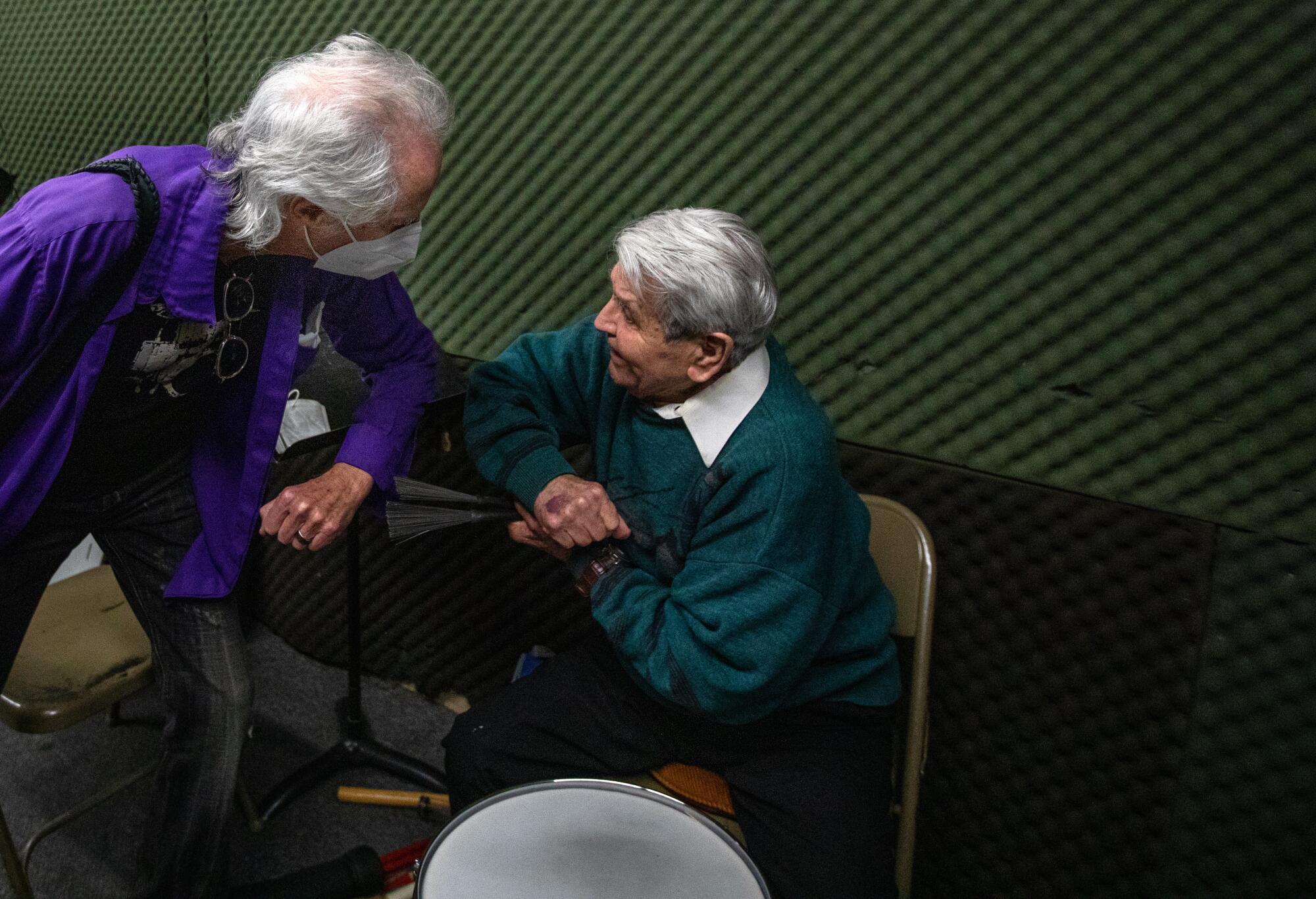
“Let’s do this,” Hideg said, calling out the first number, a Cole Porter beauty called “What Is This Thing Called Love.”
“A one, two, a one, two, three four,” Hideg counted, setting the time on his drum as Yaltkaya, an accomplished pianist, played the intro.
The sax and guitar jumped in and the band meshed beautifully, but Hideg put on the brakes and told the band to start again from the top, but up-tempo this time, and brighter.
“He has this smile on his face, and somehow that got there because of music.”
— John Densmore
Densmore, seated next to Hideg, couldn’t help himself. He reached into Hideg’s stash of percussion instruments and kept rhythm on cowbell and a set of stumpy sticks called claves. It was now a five-member band, cooking in sync, and nobody’s smile was wider than Hideg’s.
When they were done, Hideg asked if “this other drummer” would take over the snare for the next number.
“I’d like to play a ballad with brushes,” Densmore said. “Would that be all right?”
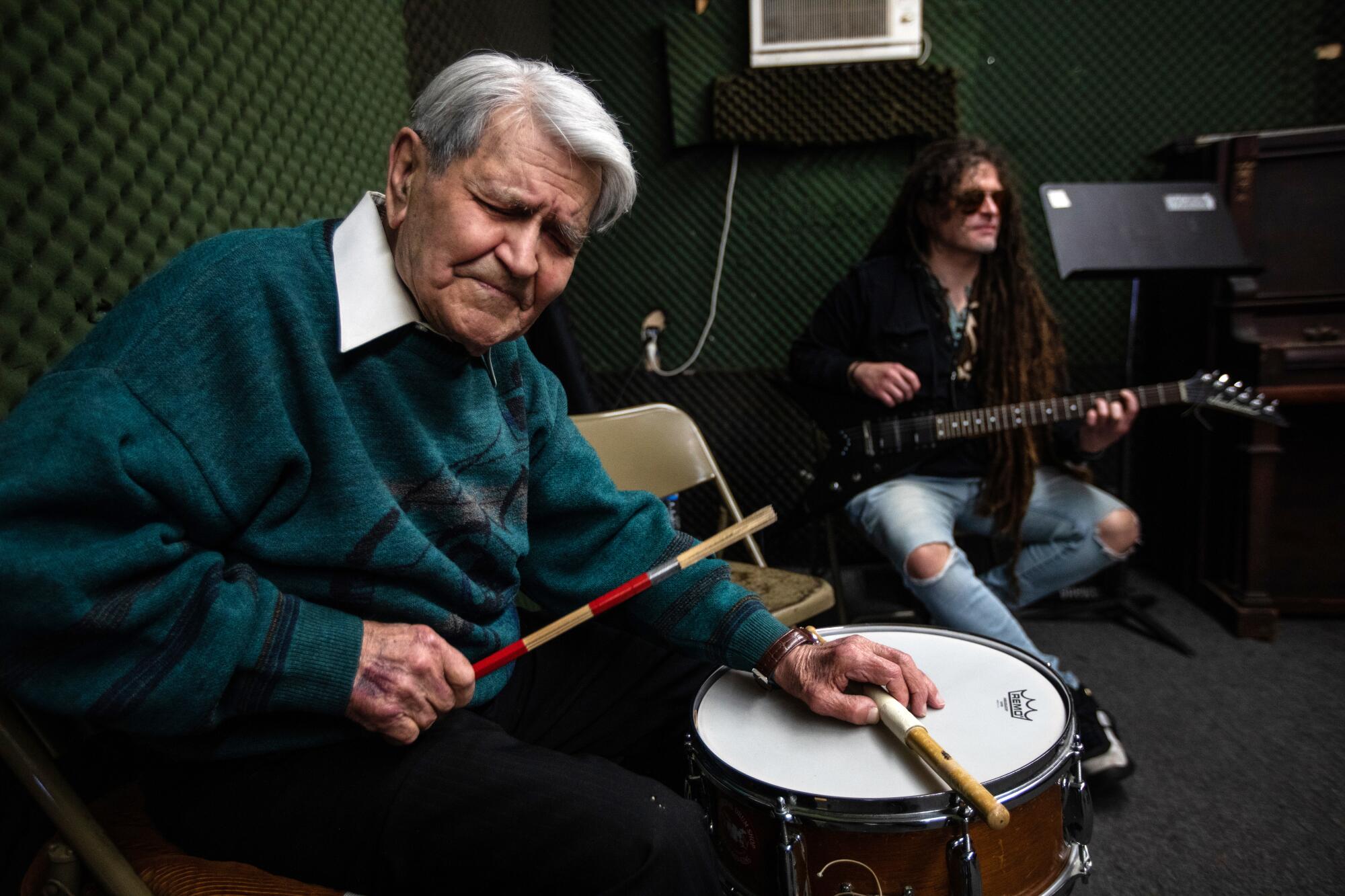
He traded places with Hideg, who needed help getting from one chair to the other.
Hideg watched the band; I watched him celebrate this moment.
This is a man whose monthly disability income is still less than his rent, which runs just over $1,000 a month. If not for what’s left in his GoFundMe account, which was set up for him in 2017 by readers who saw his story in The Times, he’d lose his apartment.
He’s a man who accomplished all he had dreamed of and more after rebelling against Soviet control and escaping under cover of darkness with his pianist wife, now deceased. He was a janitor in New York before heading to Los Angeles, where he worked his way up in the music business, formed a band — Steve Hideg and the Continentals — and booked gigs back when TV shows had live bands.
He was never rich, or particularly famous, but music always carried him.
Hideg sat in perfect contentment, listening as the hottest new band in L.A. played “I Should Care,” a soulful standard. Densmore, channeling Elvin Jones, brushed like a painter working on canvas.
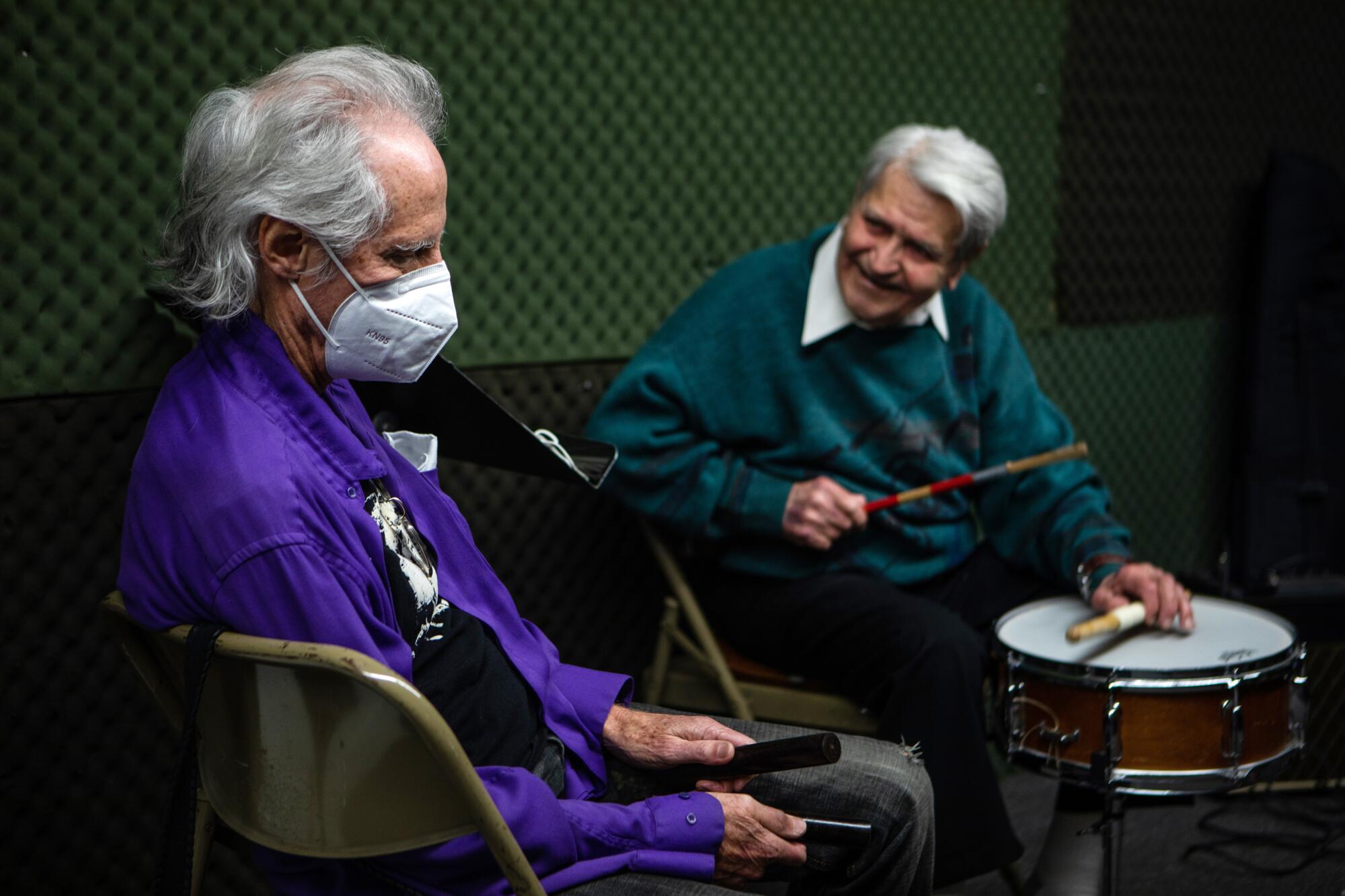
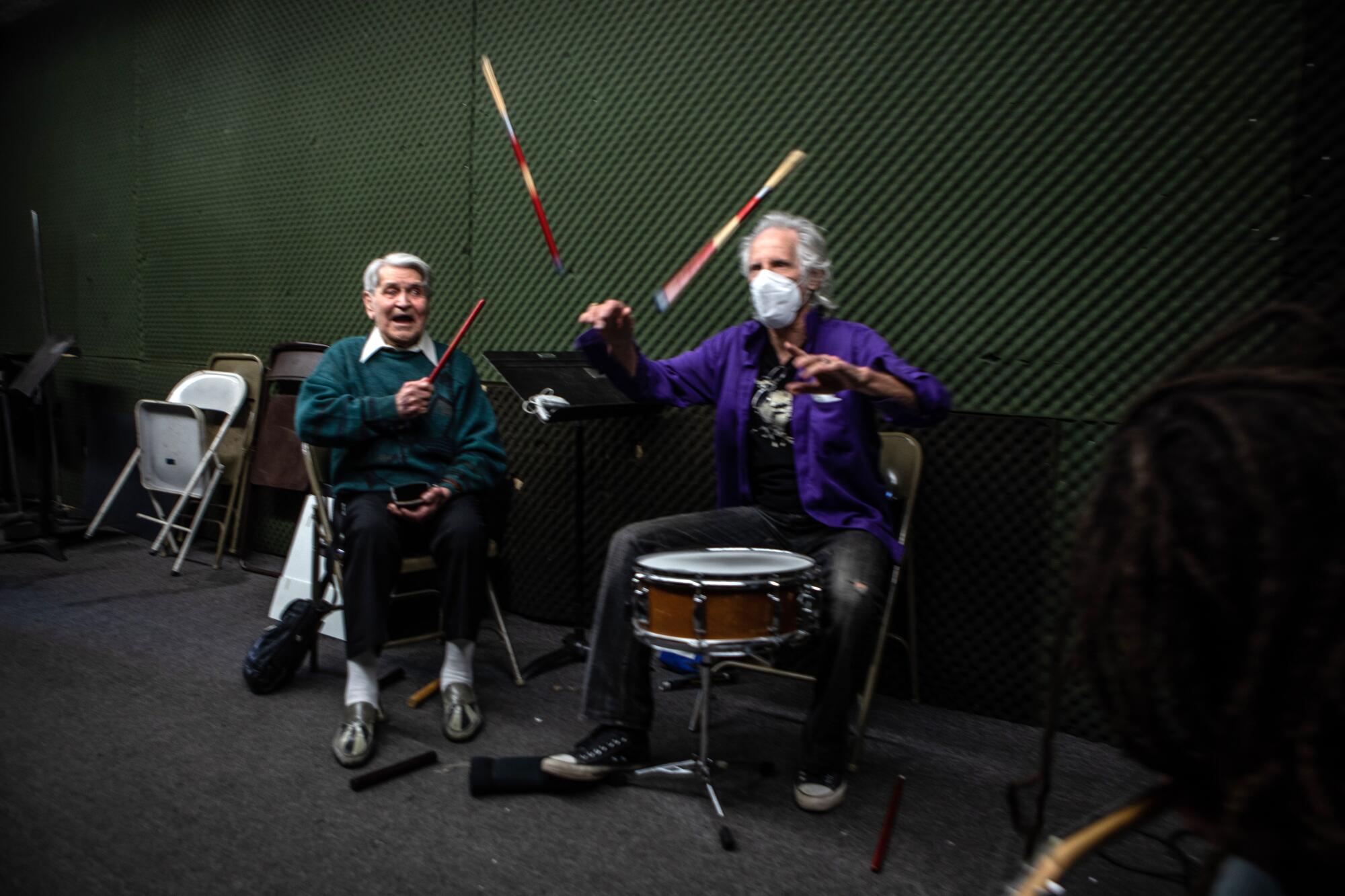
“How about a nice hand for John,” Hideg gushed as the last notes faded.
But Hideg wasn’t letting Densmore off the stage just yet. He announced that guitarist Vaz was a rocker who could sing, and he asked him to play “Wild Thing” by the Troggs.
Hideg then looked at Densmore and dead-panned, “Now, can you play rock and roll?”
He can.
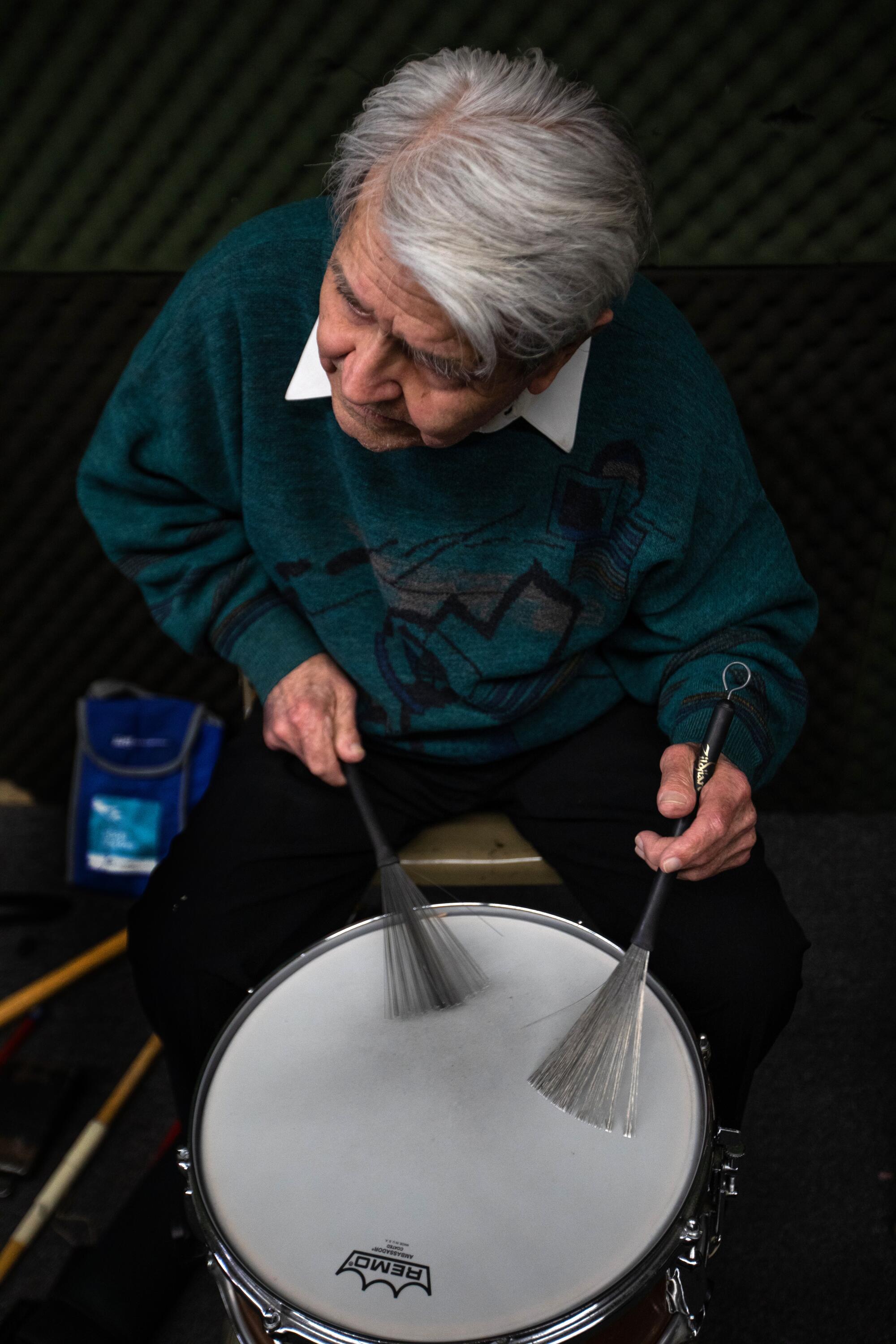
They did.
Bravo.
On a favorite Latin jazz tune of mine, “Poinciana,” Hideg handed me a brush and we played his snare together, which brought down the level of the music but gave me a thrill.
“It feeds you, and music feeds me,” Densmore said. “So we keep doing it.”
On his way out, he leaned down and said to Hideg: “Thank you so much for your inspiration.”
steve.lopez@latimes.com
More to Read
Sign up for Essential California
The most important California stories and recommendations in your inbox every morning.
You may occasionally receive promotional content from the Los Angeles Times.











